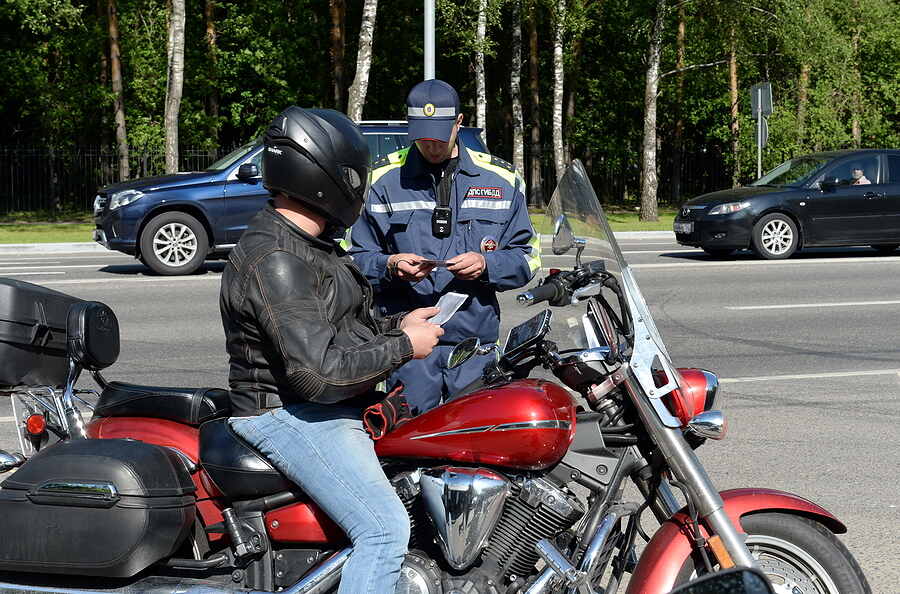Many things set motorcycles apart from cars, trucks, and SUVs. Motorcycles are typically less expensive to buy and maintain. Fill-ups at the gas station are cheaper, too. Many bikers feel a special sense of community and fellowship with other riders, and motorcycles are just plain fun.
Like any responsible driver, learning the rules of the road is imperative to enjoying a cruise on your Harley. Read on to learn everything you need to know about motorcycle laws.
How do I know what my state’s motorcycle laws are?
Your state’s Department of Motor Vehicles (DMV) is the best resource for up-to-date information on motorcycle laws. The website USA.gov maintains a list of each state’s official DMV website.
Some third-party websites use the phrase “DMV” in their website name or URL but are not government websites. These unofficial websites may contain inaccurate or outdated information.
And if you plan a road trip, be aware that laws vary from state to state. Research the laws before you hit the road so you stay compliant and avoid fines or other penalties.
Motorcycle license requirements
First things first: you can’t just buy a motorcycle and hop on, even if you already have a regular driver’s license. You’ll need to obtain a special motorcycle license or endorsement, which involves a few steps.
Depending on your state’s laws, you may need to:
- Apply for a learner’s permit
- Take a written test
- Enroll in a motorcycle class
- Practice a set number of hours
- Take a skills test
Younger motorcycle operators often anyone under 18 may have stricter or different requirements.
In West Virginia, you can either obtain a motorcycle endorsement on your driver’s license or receive a motorcycle-only license. First, you must take a knowledge test to obtain your learner’s permit. You can then either take an on-cycle skills test or complete an approved Motorcycle Safety Course.
Motorcycle helmet laws
According to the IIHS, each state’s motorcycle helmet requirement falls into one of three categories:
- No helmet laws
- Helmets are required for certain ages
- Helmets are mandatory for everyone, regardless of age
In some states, certain two-wheeled vehicles are exempt from the helmet laws, including mopeds and motorcycle bicycles. Riders should know how their state classifies their vehicle and what the relevant laws are for that vehicle.
A few states also have separate helmet laws for operators who have a learner’s or instructional permit or are newly licensed.
States with no helmet laws
Currently, three states do not have any laws that require a motorcycle rider to wear a helmet: New Hampshire, Iowa, and Illinois.
States with helmet laws for certain ages
At a minimum, all states except New Hampshire, Iowa, and Illinois require helmets for riders who are 17 years of age and younger. In many states, that requirement extends to 18 or 20 years of age. In Missouri, the law requires all riders under the age of 26 to wear a helmet.
States with helmet laws for all motorcycle riders
In several states, including West Virginia, motorcycle helmets are mandatory for all riders, regardless of age. Some helmets on the market are so-called novelty helmets and do not offer protection in the event of a crash. Under West Virginia Code §17C-15-44, the state requires that all motorcycle helmets meet certain safety standards:
“Any helmet worn by an operator or passenger shall meet the current performance specifications established by the American National Standards Institute Standard, Z 90.1, the United States Department of Transportation Federal Motor Vehicle Safety Standard No. 218 or Snell Safety Standards for Protective Headgear for Vehicle Users.”
Motorcycle DUI laws
It’s a myth that there are different penalties for a motorcycle DUI. Motorcycle operators must abide by their state’s DUI laws or face the same repercussions as any other car or truck on the road.
In West Virginia, according to §17C-5-2, all motor vehicle operators are in an “impaired state” if they:
- Are under the influence of alcohol, a controlled substance, or any other drug, or
- Have a blood alcohol concentration (BAC) of 0.08 or greater
Motorcycle DUI penalties
The penalties for a DUI vary greatly from state to state. Anyone who operates a motorcycle while under the influence could face:
- Jail time
- Monetary fines
- License suspension or revocation
- Required ignition interlock device installation
For many people, a DUI conviction means that their motorcycle will be parked for a while. That’s because, in most states, a motorcycle license is an endorsement on a regular driver’s license. A license suspension or revocation applies to all motor vehicles, including motorcycles.
Furthermore, many ignition interlock suppliers will not install devices on a motorcycle.
Motorcycle insurance laws
Motorcycle insurance isn’t just a good idea; in 49 states, the law requires it. According to the Insurance Information Institute (III), New Hampshire is the only state where insurance isn’t mandatory. In some states, you must show proof of insurance before you can register your motorcycle and receive your license plates.
The West Virginia DMV states that motorcyclists must have, at a minimum, 25/50/25 insurance coverage:
- $25,000 for one crash, one injury”
- $50,000 for one crash, two or more injuries”
- $25,000 for property damage
In addition, motorcycle operators in West Virginia must carry proof of insurance with them at all times.
[Related] Morgantown Motorcycle Accident Lawyer
Seasonal insurance coverage
In some parts of the country, motorcycle owners store their bikes during the winter. Some states may permit you to insure your motorcycle during the months that you ride it, and then drop coverage while your bike is in storage.
If you carry seasonal insurance on your motorcycle, you may need to notify your state’s DMV. In West Virginia, motorcycle owners must submit a Seasonal Statement of Insurance (WV-4B) before they stop their insurance coverage.





